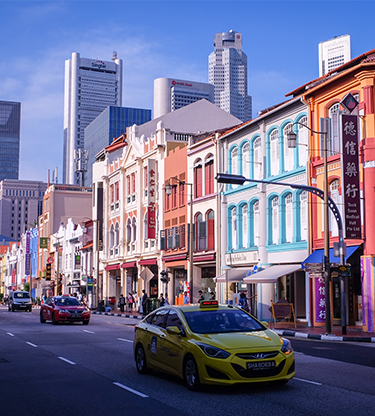Cost of living in Singapore

Share Story
Is Singapore expensive to live in?
5 minute readSingapore is a thriving, modern city-state, known as the home of a large population of working professionals within the banking, finance and IT industries. Singapore is a huge attraction for British expats working overseas, while many UK companies offer overseas posting in their Singapore offices.
A dynamic and lively city, Singapore is also considered to be an expensive location in which to live. Mercer’s 2019 Cost of Living Survey found Singapore to be the 3rd most expensive city in the world. While wages are significantly higher than many other areas in South East Asia, the cost of living can also be.
The currency used in Singapore is the Singapore dollar, with 1 British pound equalling approximately 1.77 Singapore dollars (as of 6th January 2020).
(All figures taken from Numbeo.com and exchange rates calculated on 6th January 2020 at 15.21pm).
How much does accommodation cost in Singapore?
Accommodation is considered to be on par with the most expensive European countries, with both rent and property prices at a premium in Singapore. However, the cost of accommodation depends entirely on the district you choose to move to. Most people choose to rent when they are working overseas in Singapore and commute via rail or bus into the city centre, with more affordable accommodation to be found on the west coast in areas such as Clementi, Buona Vista and Queenstown.
Below are the average prices of renting and buying accommodation in Singapore (as of January 2020).
| Monthly rent for 1 bedroom apartment (city centre) | £1,568 (2,783 S$) |
| Monthly rent for 1 bedroom apartment (outside centre) | £977.10 (1,733 S$) |
| Monthly rent for 3 bedroom apartment (city centre) | £2,942 (5,219 S$) |
| Monthly rent for 3 bedroom apartment (outside centre) | £1,698 (3,012 S$) |
| Price per square meter to buy apartment (city centre) | £15,113 (26,810 S$) |
| Price per square meter to buy apartment (outside centre) | £7,604 (13,489 S$) |
Cost of transport in Singapore
Travelling around Singapore is quick, easy and cost-effective via a vast public transport network that includes rail, bus and tube. Costs for single fares are little more than £1, while monthly travel passes provide an affordable option for those commuting to and from work.
Car prices, however, are significantly more expensive than you may be used to in the UK or the rest of Western Europe. Although, with such a reliable transport network and taxi services at their fingertips, many who live in Singapore find little reason to own a car. Below are the average prices of transport within Singapore.
| Single bus ticket | £1.01 (1.80 S$) |
| Monthly public transport ticket | £67.63 (120.00 S$) |
| Petrol (1 litre) | £1.27 (2.25 S$) |
| Volkswagen Golf | £65,632 (116,450 S$) |
| Toyota Corolla | £67,262 (101,598 S$) |
What is the cost of living in Singapore?
The cost of living in Singapore for amenities and entertainment is relatively on par with the prices you might find in London, however supermarket and grocery prices can be considered as slightly costlier than back in the UK. That being said, items that are commonplace in the UK may be rarer in Singapore and as such will cost a premium compared to more commonly eaten food.
Below are some examples of the average prices you may find in Singapore for several miscellaneous goods and services.
| Milk (1 litre) | £1.73 (3.07 S$) |
| Bread (500g loaf) | £1.29 (2.29 S$) |
| Eggs (12pk) | £1.66 (2.95 S$) |
| Water (1.5 litre bottle) | £0.95 (1.68 S$) |
| Chicken Breast (1kg) | £5.01 (8.89 S$) |
| Cappuccino (regular, in a restaurant) | £3.07 (5.45 S$) |
| Beer (500ml, in a restaurant/pub) | £5.64 (10.00 S$) |
| Cinema ticket | £7.33 (13.00 S$) |
| Gym membership (monthly) | £76.06 (134.97 S$) |
| Preschool/Kindergarten (monthly) | £654.15 (1,161 S$) |
| Primary School (yearly) | £15,661 (27,791 S$) |
Living in Singapore can be an incredible experience, and can be made all the more enjoyable when you get the most out of your money. Working with a foreign exchange specialist allows you to enjoy great exchange rates and avoid the costly fees that UK high-street banks can charge. Save time and money on your international payments, whether you’re transferring savings over from the UK or sending money home to your UK bank account.
Making the most of your international payments account
Tips on making the most for your money when you emigrate
Our News Hub has plenty of easy-to-read guidance on how to emigrate abroad




